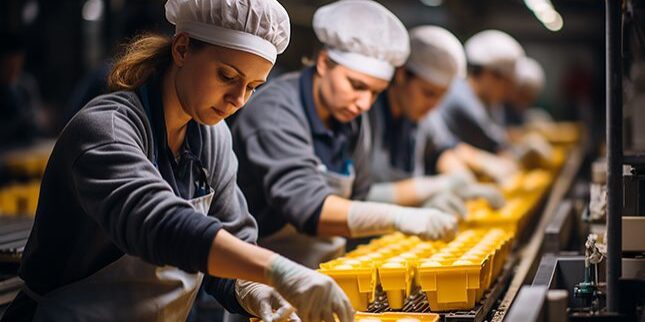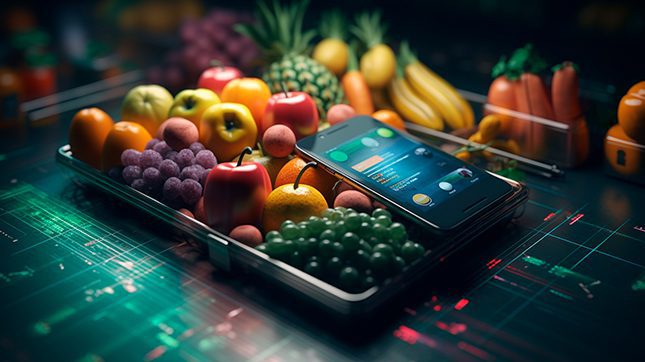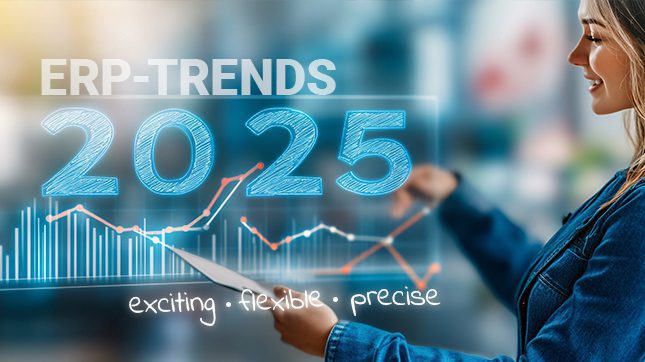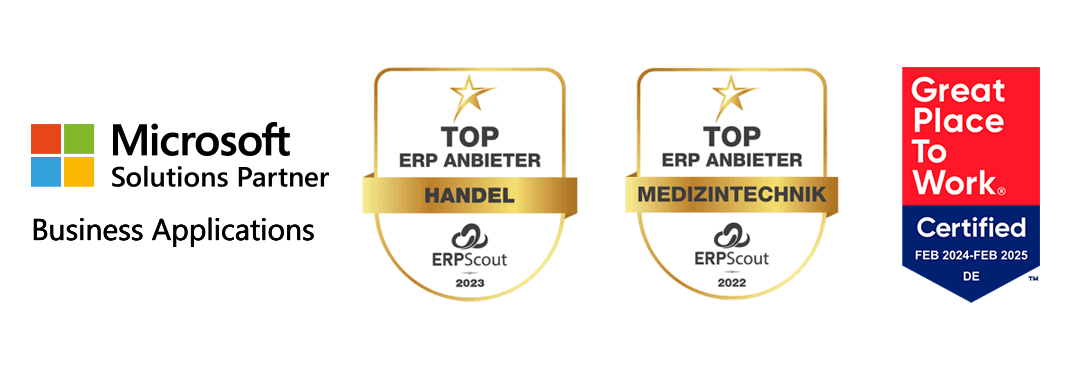Sustainability in food production
Strengthening sustainable production in the food and beverages industry? In this article, we show you what's behind it and how ERP can help.
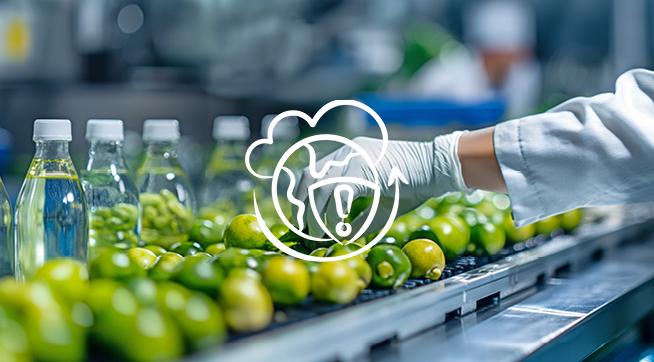
7. April 2025
Food and beverage producers are facing major challenges: Reducing food waste, cutting CO₂ emissions and at the same time meeting the increasing demands for transparent processes is the basis for remaining competitive. An ERP system with processes specially tailored to the food industry provides support. It structures processes, minimizes inefficiencies and supports companies on their way to greater sustainability – exactly what they need to remain competitive and meet market requirements in the long term.
Food and beverage production: the biggest challenges
What factors make food producers sweat? The industry has to overcome a number of complex challenges to make the difference between success and stagnation. Among the biggest are:
1. Food waste
According to the Food and Agriculture Organization of the United Nations (FAO), 1.3 billion tons of food are disposed of every year. This corresponds to around a third of global food consumption . Causes such as overproduction, fluctuating demand and inefficient storage exacerbate the situation. The sad result: far too much waste and high economic losses.
Food-producing companies run the risk of losing valuable reputation, as consumers value sustainable production. Solutions to minimize waste and operate more sustainably lie in greater transparency, more efficient processes and innovative technologies.
How the right food ERP can help
Use effective stock management to reduce food waste as much as possible. You can view the current stock of your goods, including expiration dates, and reorder raw materials in good time if required. Another advantage of transparent stock management is that you work according to the principle of first expired first out. By processing the materials that expire first, you avoid waste caused by goods that have been stored for too long and use every raw material efficiently.
In addition, integrated production planning enables precise production mechanisms without overcapacity and the targeted use of raw materials. Less use of resources, less waste, less food wastage.

2. Energy consumption and CO₂ emissions
Food production is in a dilemma: on the one hand, rising energy costs are a burden on your production, on the other hand, it should be as climate-neutral as possible. Strict regulations also require the reduction of required resources and the resulting CO2 emissions. However, food and beverage producers often struggle with outdated infrastructure, high investment costs and the search for efficient, scalable solutions. Time and leisure to meet the requirements quickly fall by the wayside. But how do you manage to meet the requirements and remain competitive at the same time?
How the ERP industry solution from YAVEON helps
Your ERP system supports you in optimally controlling and planning machine utilization. By precisely coordinating production processes, idle times are reduced. Because machines are less likely to stop unnecessarily, power consumption is reduced. By using resources efficiently, you save energy, reduce operating costs and act sustainably. But your ERP also enables you to plan ahead and use capacities sustainably. This makes your entire production process both more economical and more ecologically responsible.
3. Transparency in the supply chain
Where do the raw materials come from and what quality is behind them? Consumers are placing increasing importance on knowing the origin and quality of purchased products and ensuring that they have been produced sustainably. At the same time, legal requirements such as the EU supply chain laws are increasing the pressure on food-producing companies. Ensuring traceability across all stages of the supply chain while managing increasing documentation and compliance requirements is a headache. As a result, producers are obliged to ensure complete transparency and more efficient processes and must react quickly to regulatory changes. This is the only way to gain and maintain consumer trust in the long term.
How the right food ERP can help
Seamless transparency and documentation are basic factors for sustainable production. This is why you rely on traceability with your ERP industry solution. You can reliably view the origin, composition and delivery of individual products and product components and are able to provide information at any time. The inclusion of properties and characteristics directly on the item also helps you to view and take into account the most important properties during production. To meet the strict compliance requirements, you can also use electronic signatures and audit trails. Changes are logged and documented together with the user stamp and time stamp.

4. Strict compliance requirements, safe products and the highest quality
Compliance with legal regulations and industry-specific standards is essential for food-producing companies. Whether HACCP, IFS or BRC: as a food or beverage producer, you have to meet extensive requirements and provide complete documentation. You make no compromises when it comes to the quality of your products, because you have to guarantee safe enjoyment and impress your customers in the long term. The pressure from audits and certifications is also increasing noticeably. If you rely on manual table maintenance or unsuitable solutions, you will quickly face a time and resource problem
How the ERP industry solution from YAVEON helps
Working in compliance with regulations, reliably and safely. The right ERP industry solution fulfills the strict criteria of the food industry and meets all relevant requirements. Such a solution supports you with inspection processes and quality controls, audit trails and detailed documentation. Deviations can be easily identified in cockpits, allowing you to take direct countermeasures. In this way, not only ensures compliance with standards, but also strengthens your position in the market.
Competitive advantage no. 1: Producing food sustainably
It turns out that for companies in the food industry, sustainable thinking and production encompass far more than just environmental protection. They are the central factor in achieving economic success and progress. Companies that focus on sustainable strategies not only strengthen their contribution to a future worth living, but also secure long-term competitive advantages. Resources are used more efficiently, costs are reduced and the trust of customers and partners grows.

The following aspects make sustainability in food production a success factor for market leaders:
Reputation and good image
By saving raw materials and waste, you help to reduce your carbon footprint, promote the sustainable management of resources and strengthen your competitiveness and your company's reputation through environmentally friendly innovations. On the one hand, you meet the growing legal requirements and, on the other, you increase your attractiveness for environmentally conscious customers and partners.
Economic success
Sustainable processes create efficiency and reduce costs – the ideal basis for developing innovations that open up new business opportunities for you. Your economic performance grows, you celebrate financial success and increase your attractiveness for investors, partners and customers.
Social skills
Transparency and sustainability strengthen the relationship with consumers and support compliance with global social standards. This promotes trust and loyalty towards customers, ensures a traceable supply chain and strengthens a positive corporate reputation. Social responsibility is also an advantage in the search for new talent. After all, companies that act sustainably are attractive employers for committed young talent and a factor in long-term employee satisfaction.
Sustainable production: ecological aspiration and economic opportunity at the same time
Sustainability has long been a must in the food industry – ecologically, economically and in terms of reputation. Those who rely on a modern ERP will secure numerous advantages. With the ERP industry solution from YAVEON, you can expect greater efficiency through optimized processes, less wastage of resources, transparent traceability and compliance with legal requirements. At the same time, you strengthen your customer loyalty and position yourself as a future-oriented company. In short: you act sustainably and profitably at the same time
Your product on the shelf. Your ERP in the heart.
Make the right decision now and make your production innovative, reliable and environmentally conscious.



